What Are Healthy Boundaries and How to Set Them?

In this article
Boundaries are a way to practice self-care and protect your personal or mental space. Maintaining strong personal boundaries can help boost your self-esteem, improve a sense of identity, strengthen your relationships, and avoid unhealthy connections.
In this article, we’ll talk about what healthy boundaries are, why they are important for self-care, and how to set boundaries with friends, intimate partners, and co-workers to protect your self-esteem and enjoy healthy relationships.
What are healthy boundaries and why do they matter?
Boundaries are physical or emotional limits of appropriate behavior between people that a person creates to protect themselves from being used, drained, or manipulated by others. Boundaries are unique to each person, and they help define where one person ends and the other begins, so they are a crucial part of maintaining identity.
Setting boundaries is considered an important relationship skill. We set boundaries for ourselves on how we want to be treated by other people and how we treat others. Boundaries can be set with romantic partners, friends, family, co-workers, and strangers to communicate to others what types of communication, behavior, and interaction are acceptable for you and what you will and won’t tolerate.
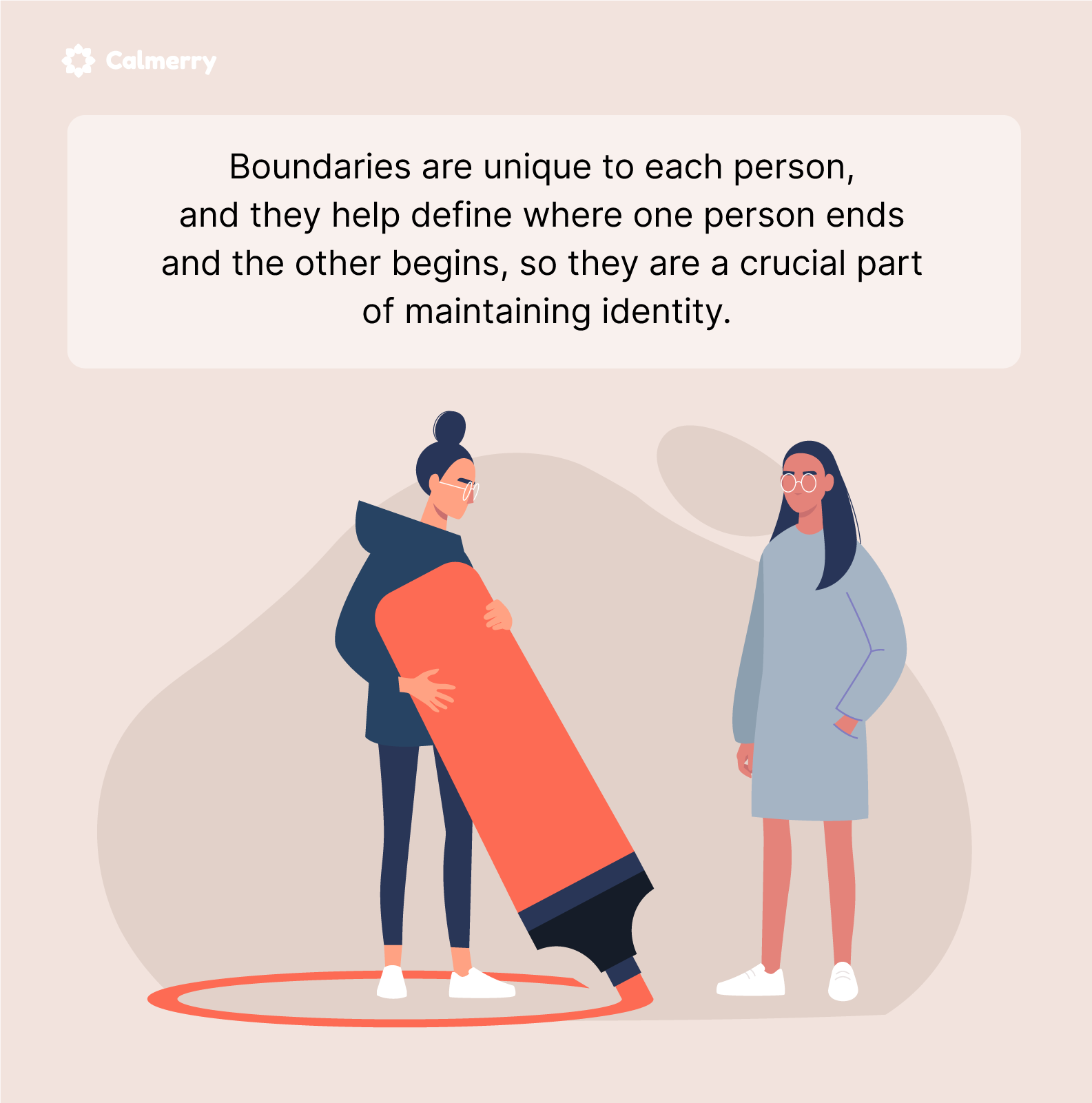
Healthy boundaries in relationships aren’t about controlling someone, they’re bidirectional. They are all about respecting and honoring your wants, needs, and limits as well as those of the other person in the relationship.
Why is it important to set personal boundaries?
- Healthy boundaries are a crucial component of self-care – they help you make decisions independently based on what is best for you, not just the people around you.
- Healthy boundaries create mutual respect between people, allowing them to communicate their needs and limits and ensuring that the well-being of each person is respected.
- Healthy boundaries give you a sense of empowerment and self-respect and reduce codependent habits.
- Healthy boundaries allow you to be assertive. You’re able to confidently and truthfully say “yes” or “no” and accept when others say “no” to you.
- Good boundaries allow you to live a fulfilled, balanced life on your terms while acknowledging the needs of other people around you.
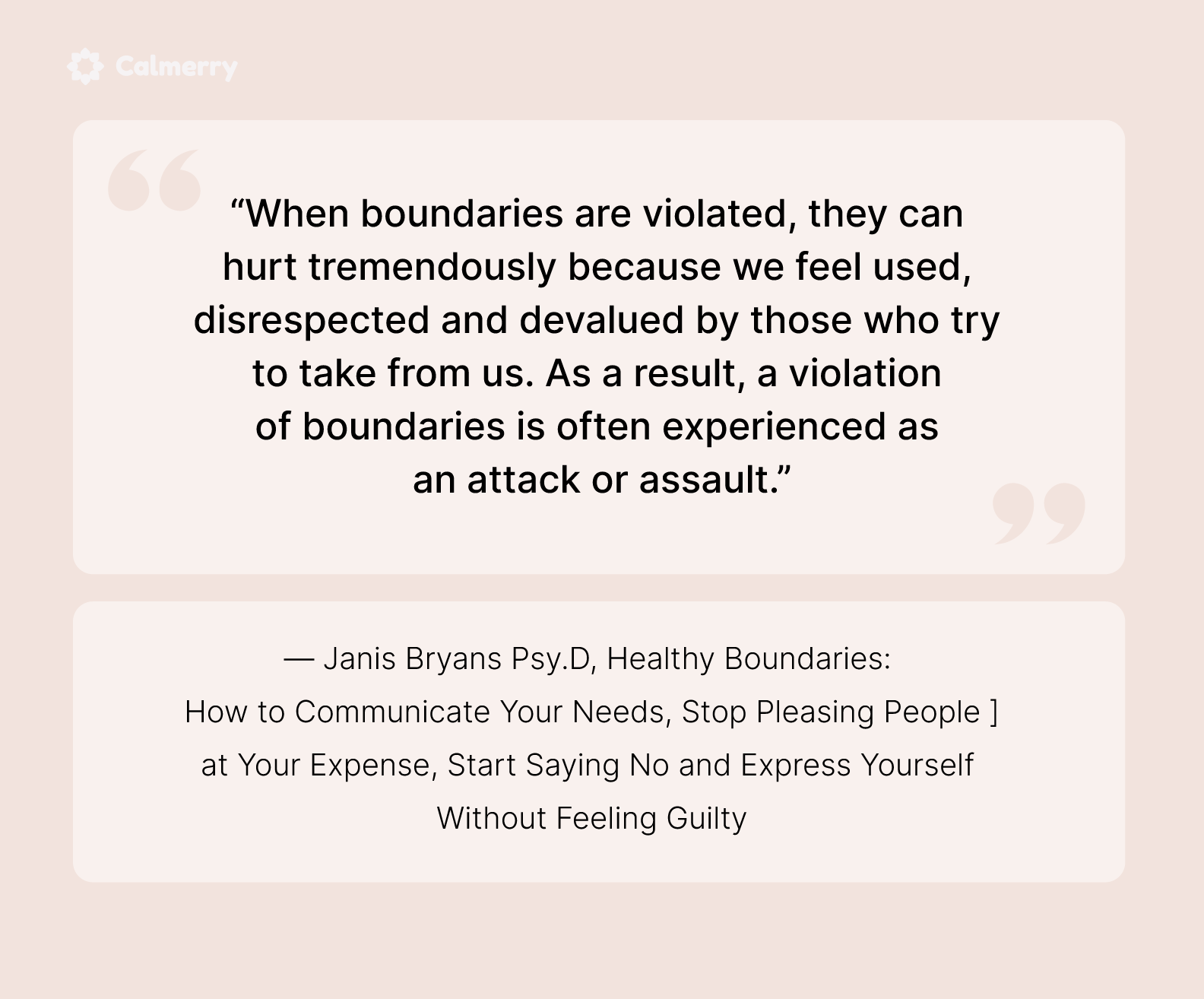
Types of boundaries
Personal boundaries typically fall into a few specific categories, such as:
Physical boundaries refer to your sense of personal space, your privacy, and your body. They help keep you comfortable and safe when you’re interacting with people closest to you and dealing with strangers.
Emotional boundaries protect your right to have your own feelings, and not to have them criticized, belittled, and minimized. You can use these barriers to prevent yourself from feeling responsible for how other people feel. Emotional boundaries also help us show empathy to other people without absorbing their feelings.
Intellectual or mental boundaries protect personal beliefs, choices, ideas, and values. They help us respect one another’s different viewpoints on certain topics without sharing all opinions or adopting all views and can keep our feelings from being hurt.
Sexual boundaries are your expectations concerning intimacy. They protect your right to consent, to communicate your sexual preferences, and to honesty about your partner’s sexual history. Healthy sexual boundaries between intimate partners include mutual agreement and consent and an understanding of each other’s sexual limits and desires.
Material /financial boundaries extend to your financial resources and belongings, including money, car, home, clothing, etc. They protect your right to spend your money as you choose and to not give or loan your possessions or money if you don’t want to.
Time boundaries are about how you spend and use your time. They protect your right to prioritize your time for self-care and have alone-time without any interruptions and distractions.
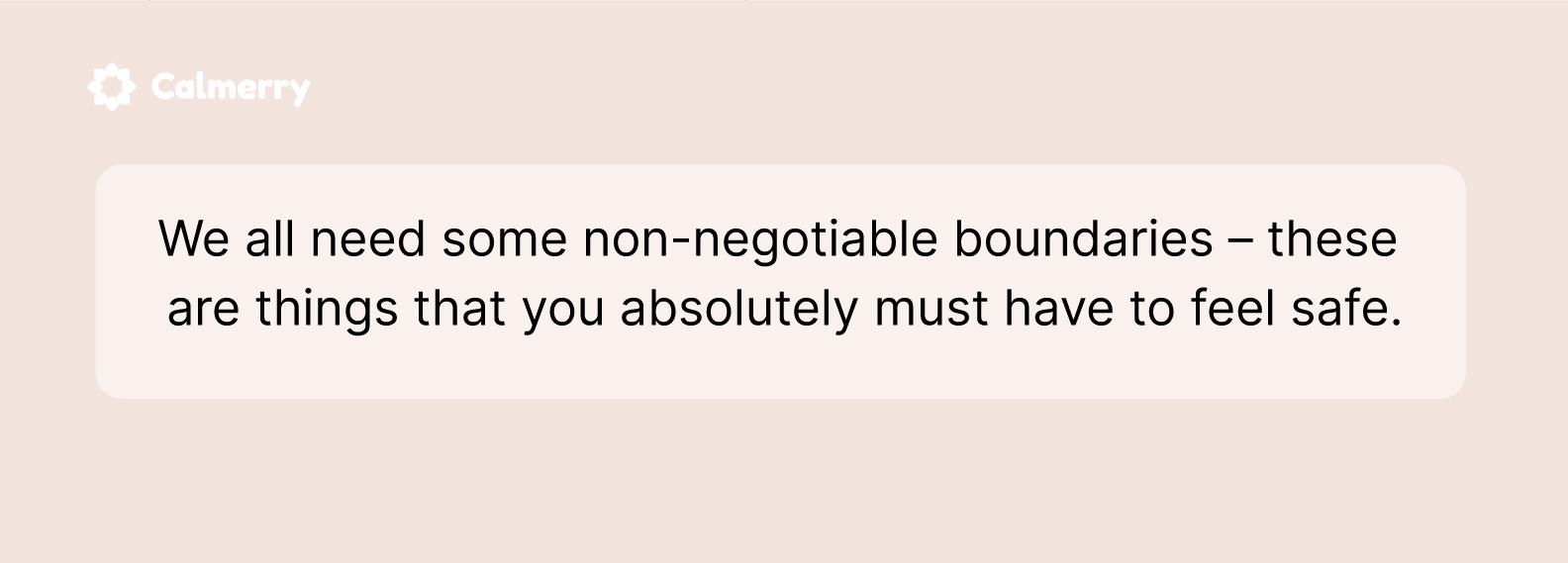
Not every relationship requires you to address each specific type of boundary from the list above. For example, you might need to set physical and emotional boundaries with your coworkers but not financial ones. But we all need some non-negotiable boundaries – these are things that you absolutely must have to feel safe. They are related to safety issues, such as physical violence, emotional abuse, life-threatening health issues, infidelity, and drug or alcohol use.
How to set healthy boundaries
People typically learn the skill of setting and maintaining boundaries during their childhood years within their families, and it’s the responsibility of parents to set healthy, flexible boundaries for their kids. But if you grew up in a dysfunctional family without clear, consistent boundaries and expectations, you may struggle with setting boundaries and even feel guilty. about it.
Setting boundaries with parents, partners, and friends isn’t always easy, but it comes down to communication. It’s simply identifying your boundaries (you may even write them out in a journal) and communicating your wants and needs for healthy interaction to someone else clearly, calmly, and consistently. Try to be concise, and don’t justify, get angry, or apologize for the boundary you are setting.
Remember that you aren’t responsible for how the other person reacts to your boundary. If it upsets them, it’s their problem. And if your boundaries aren’t respected, you need to evaluate your options and take action.
Here are some examples of how you can clearly communicate your boundaries:
I get uncomfortable when people are too close to me. I need a little more personal space. (Physical boundary)
I’m not willing to discuss this topic right now. (Conversational boundary)
I respect your opinion, but please don’t force it on me. Accept that we see things differently. (Mental boundary)
I feel embarrassed when you joke about me to your friends. I don’t find such jokes funny and I’d like you to stop. (Emotional boundary)
I can only stay for an hour. (Time boundary)
Please ask me first before you borrow my car. (Material boundary)
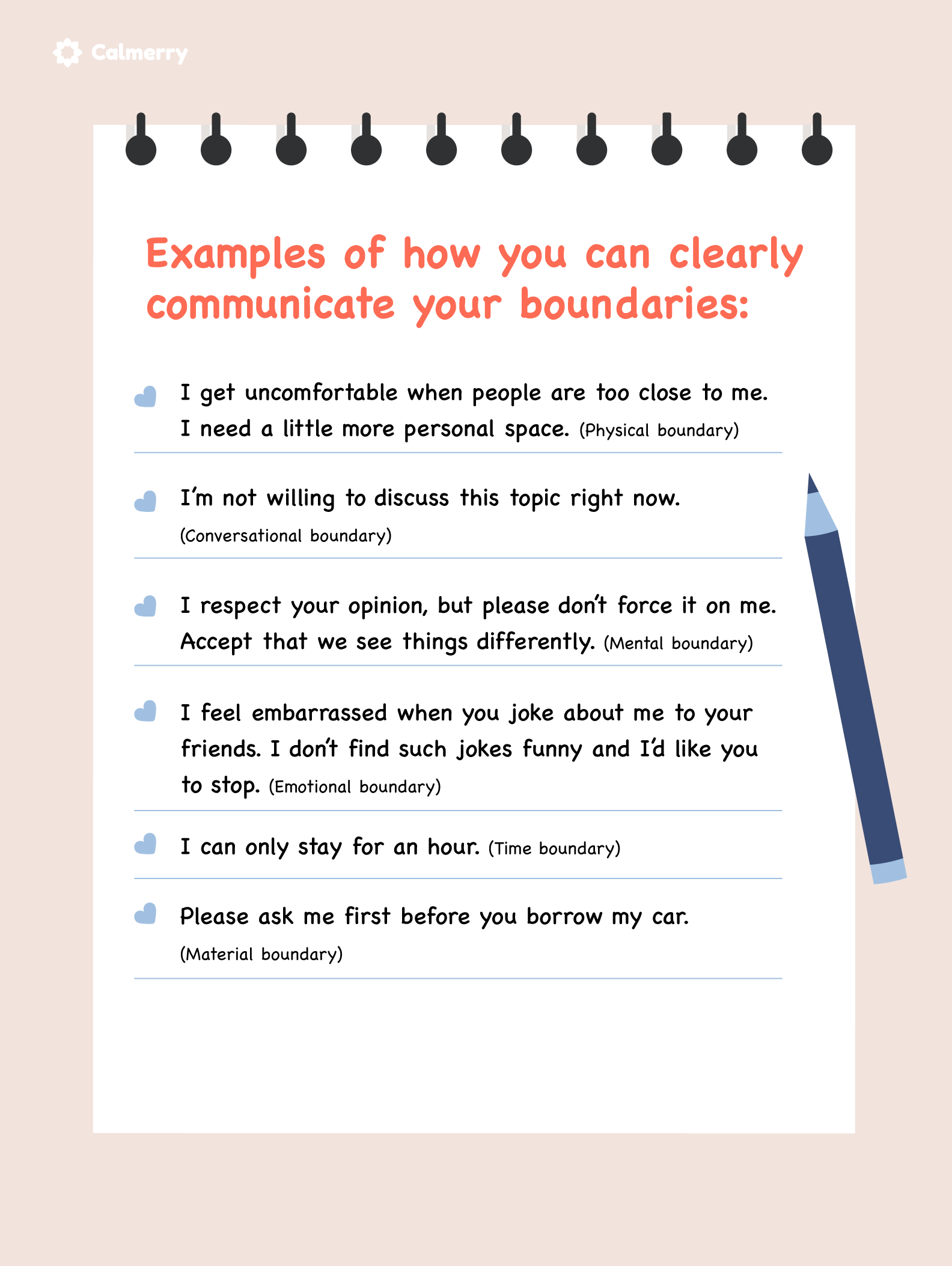
Of course, we can’t make people respect our boundaries, but we can control how we respond. Not everyone may understand your boundaries and even may choose to violate them. And some people will never accept your boundaries no matter what you do.
Then, you have the right to create further distance between yourself and that person who wants to manipulate, abuse, or control you or end that toxic relationship before it takes over your life. You deserve to feel respected in any relationship, so you shouldn’t accept unhealthy boundaries no matter how much you care about the person. And you should keep in mind that you don’t have the right to cross someone else’s boundaries.
Final Thought
Setting healthy boundaries is crucial for our mental health and well-being. They keep us safe, differentiate each person from others, and help us focus on things that are most important to us. Clear boundaries also create clear expectations and responsibilities and improve our relationships at work, at home, and in social circles.
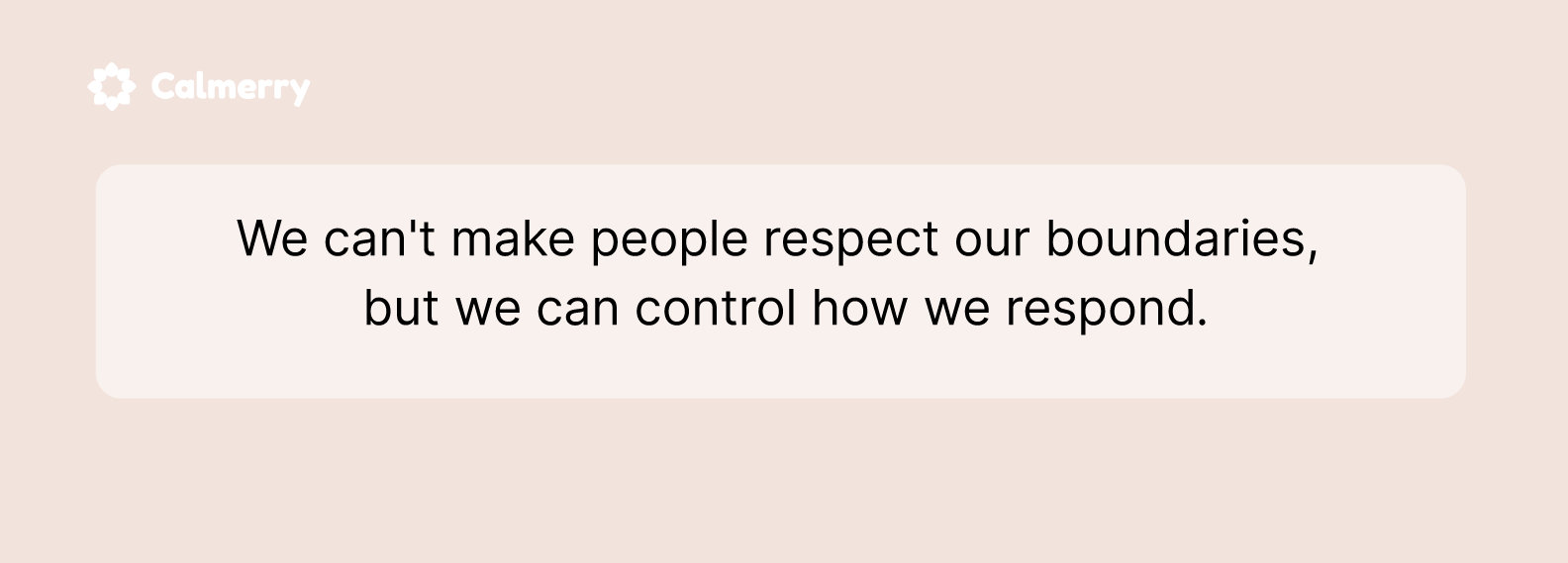
Setting healthy boundaries can be challenging, but it’s empowering, and you don’t have to do this work alone. It may be helpful to seek support from a mental health professional, and online therapy is a good option to get support from the comfort of your home. Calmerry counselors can provide you with guidance on how to determine the boundaries that are most important to you and establish them in your relationships with partners, friends, parents, and co-workers.
online therapy
live video session


